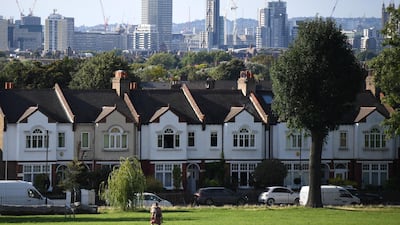British mortgage lending rose by £11.8 billion ($16.36bn) in March in the strongest net increase on record after Chancellor Rishi Sunak extended a tax break for property buyers.
The rise in mortgage borrowing, the biggest increase since records began in 1993, came as British lenders approved 82,735 mortgages in March, a decrease of almost 5,000 from February and down from the peak of 103,100 seen in November, Bank of England data showed.
“The strong borrowing was driven by the expected ending of the temporary stamp duty tax relief at the end of March, which has now been extended to the end of June," the BoE said.
The mortgage approval level was still above pre-pandemic rates, with 73,000 mortgages approved in February last year.
Britain's housing market soared last year after the first coronavirus lockdown created pent-up demand and Mr Sunak's stamp duty break, unveiled in July, boosted activity in the sector even more.
The tax break was due to expire at the end of March, but Mr Sunak extended it until June in his March budget statement, with the first £500,000 of any property purchase in England or Northern Ireland remaining exempt from the levy. There will also be a £250,000 tax-free allowance until the end of September.
The average British house price hit a record high of £254,606 in March, according to the Halifax House Price Index, as the market saw a resurgence in activity, with prices 6.5 per cent higher than in March 2020 – the equivalent of £15,430 in cash terms.
The actual interest rate paid on newly drawn mortgages rose 4 basis points to 1.95 per cent in March, the BoE said, above the low of 1.72 per cent in August last year, with the average rate paid by borrowers sitting at 2.1 per cent.
"Low interest rates, the stamp duty holiday, and a paradigm shift in homeworking, are collectively proving a heady cocktail for the property market, and consumers are looking to make the most of favourable financial conditions to climb the housing ladder," said Laith Khalaf, financial analyst at AJ Bell.
Mr Khalaf said alarm bells may be ringing because the previous peak in borrowing came in October 2006, just before the global financial crisis, but he said banks are much better capitalised this time around and much stricter in terms of their lending activity, with higher deposits taken on mortgages.
"This doesn’t prevent a downturn in the housing market, but it reduces the chance of a catastrophic systemic meltdown if property prices falter," Mr Khalaf said.
Meanwhile, Britons made a £0.5bn net repayment of consumer credit in March, slightly lower than the average £1.9bn seen each month over the past year. March was the last month of full lockdown in England before non-essential shops reopened in April along with outdoor cafes and restaurants.
Unsecured lending to consumers was 8.6 per cent lower than in March last year when Britain’s first coronavirus lockdown started.
However, household deposits remained strong in March, with a net flow of £16.2bn, higher than the £15.2bn monthly average seen since March last year.
“Consumers continue to save large chunks of money into bank accounts paying little or no interest. These latest figures show the state of play in March, when full lockdown was still largely upon us," said Mr Khalaf.
"When the Bank of England next updates us on April’s consumer activity, we’ll be able to see if the reopening of the economy is beginning to put the pandemic savings habit into reverse. Consumers paid down less credit card debt in March, which tentatively suggests that might be beginning to happen."
Separately, British manufacturing activity grew at the fastest pace in almost 27 years in April, amid supply chain delays and shortages of raw materials, as businesses tried to make up for the fallout from the pandemic.
The IHS Markit/CIPS Purchasing Managers' Index (PMI) for manufacturing activity rose to 60.9 in April from 58.9 in March, slightly above an earlier flash estimate of 60.7 and its highest reading since July 1994.
New orders rose at the fastest pace since November 2013, and two-thirds of businesses expect production to be higher in a year's time.
More on the UK property market
British house prices surge at strongest pace since 2004
Majority of London rents now lower than they were five years ago


